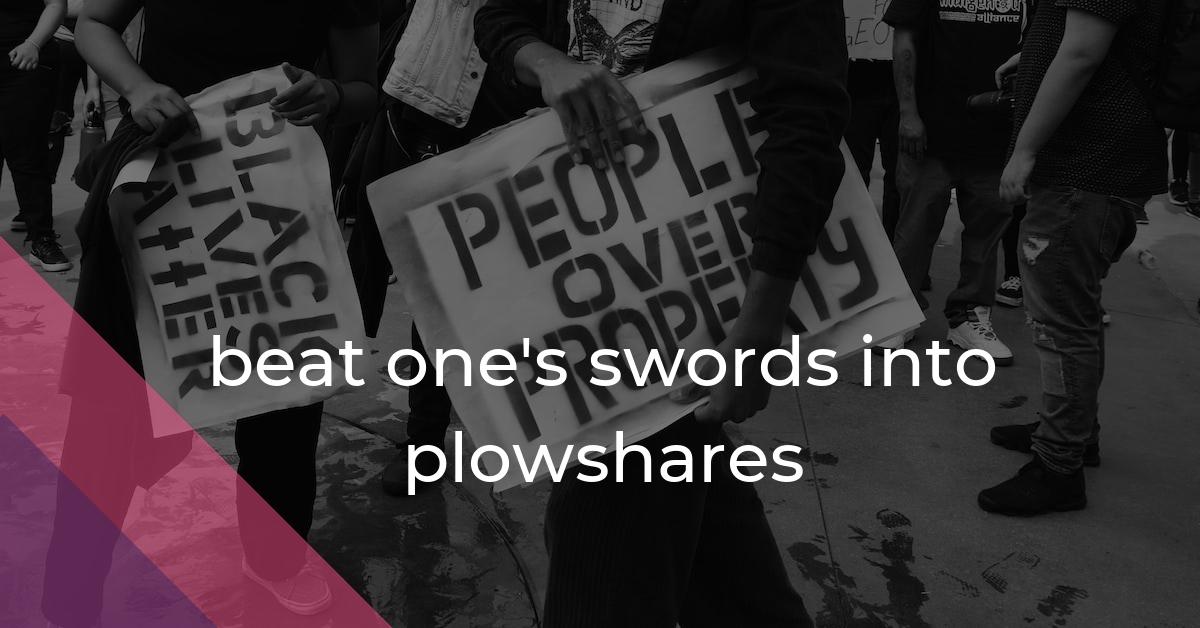beat one’s swords into plowshares: Idiom Meaning and Origin
What does ‘beat one's swords into plowshares’ mean?
The idiom "beat one's swords into plowshares" means to shift from military aggression to peaceful and productive activities. It signifies the transformation of weaponry into tools for farming and symbolizes the pursuit of peace and prosperity over violence.

Idiom Explorer
The idiom "sheathe the sword" means to withdraw from a conflict or to end hostilities. It derives from the act of putting a sword back into its sheath, symbolizing the cessation of aggression or violence.
The idiom "fight fire with fire" means to combat a problem or attack by using similar methods or tactics as the opposite party. It suggests using their own aggressive actions against them.
The idiom "cross swords" means to have a conflict or engage in a fierce argument or disagreement with someone.
The idiom "bring a knife to a gunfight" means to enter a situation without being adequately prepared or equipped, and thus have little chance of success or survival.
The idiom "beat as one" means to have a synchronized rhythm or to work together perfectly in a unified manner.
The idiom "beat a dead horse" means to continue to pursue a lost cause or to waste time and energy on something that is already over and done with.
"Another string to one's bow" means to have an additional skill or resource that can be used if needed. It comes from archery, where having multiple strings attached to a bow gives you more chances to hit the target.
The idiom "all to smash" means to completely destroy or ruin something. It suggests a severe or catastrophic level of damage or loss.
The idiom "bear fruit" means to produce positive or desired results or outcomes after putting in effort or waiting patiently.
The idiom "bear away the bell" means to win a prize or be recognized as the best in a competition or contest.
Swords Transformed
The idiom "beat one's swords into plowshares" is a metaphorical expression that originated from the Bible. It can be found in the Book of Isaiah in the Old Testament, specifically in Isaiah 2:4. The passage states, "They shall beat their swords into plowshares and their spears into pruning hooks; nation shall not lift up sword against nation, neither shall they learn war anymore." This idiom is often used to convey the idea of transforming weapons and tools of war into instruments that promote peace and productivity.
This concept of repurposing existing resources for benevolent purposes is at the core of the phrase "beat one's swords into plowshares." By taking the act of beating swords and turning them into agricultural tools, the metaphor emphasizes the shift from conflict and destruction to peace and prosperity. It symbolizes the abandonment of violence and the embrace of peaceful pursuits.
While the idiom has its roots in the Bible, its message goes beyond religious boundaries and has become a common expression in various cultures. It is frequently used in discussions about disarmament, pacifism, and the search for peaceful resolutions to conflicts.
The metaphorical nature of the idiom allows for its interpretation in different contexts. It can represent the transformation of personal attitudes or the collective shift towards a more peaceful society. The idiom encapsulates the idea that violent tendencies can be redirected towards constructive purposes and highlights the possibilities of growth and development that lie beyond conflict.
Throughout history, this idiom has been utilized in speeches, literature, and artworks to advocate for peace and non-violence. Its memorable and evocative imagery has made it a powerful tool for conveying aspirations for a world free from war and strife.
Despite the positive message the idiom carries, its direct application in practical situations may encounter challenges and complexities. Achieving disarmament and pursuing peace often require significant social, political, and cultural transformations. While the metaphor inspires hope and encourages peaceful action, reaching its ideals may demand sustained effort, dialogue, and collaboration.
Nevertheless, despite these challenges, the enduring relevance and continued usage of this idiom indicate the universal human desire for peace and the belief in the possibility of a harmonious world. The idiom serves as a reminder of the power of transformation, both on an individual and societal level, and urges us to explore alternative paths to conflict and violence.
The idiom "sheathe the sword" is related to the concept of beating one's swords into plowshares. It suggests the act of putting away weapons and refraining from using them aggressively. When one sheathes their sword, they are choosing to avoid conflict and embracing peace.
The expression "cross swords" refers to engaging in a conflict or confrontation. In contrast to the idiom "beat one's swords into plowshares," which promotes peace, "cross swords" signifies coming into direct opposition with someone or engaging in a battle of ideas or interests.
In a different context, the idiom "fight fire with fire" is related to the idea of transforming weapons into peaceful instruments. This expression implies using an opponent's tactics against them. While it can have negative connotations, it underscores the concept of using one's resources and strength strategically to restore harmony and balance.
Another related idiom is "bring a knife to a gunfight," which reflects the concept of inadequate preparedness or being ill-equipped to face a specific challenge or conflict. It suggests the importance of understanding the nature of a situation and ensuring that the means used to address it are appropriate and effective.
The phrase "beat as one" resonates with the overarching message of beating one's swords into plowshares. It signifies unity, cooperation, and collaboration. Just as swords can be transformed into plowshares to promote prosperity and peace, individuals and communities can join forces to achieve common objectives and work towards a harmonious coexistence.
Example usage
Examples of how the idiom beat one's swords into plowshares can be used in a sentence:
- After the war, the government decided to beat their swords into plowshares and focus on rebuilding the economy.
- Instead of seeking revenge, he chose to beat his sword into a plowshare and promote peace through diplomatic channels.
- The artist used the concept of beating swords into plowshares as a symbol of transforming violence into productivity in his latest sculpture.
More "Metaphorical" idioms



